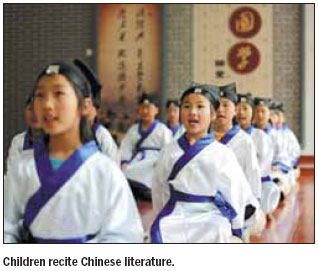Providing equal education for city's migrant children
( China Daily )
Updated: 2013-11-04
|
|||||||||
After somersaults and handstands, little kungfu champion Li Zhongzhou falls to the ground like a drunken man. Moments later he jumps up and leaps into the air as he strikes various moves.
Nicknamed "little Bruce Lee", the 11-year-old champion of many national martial arts contests was comparing moves with classmates during an interval between classes in Tangshi Primary School in Zhangjiagang city, eastern Jiangsu province.
"We picked up martial arts at our school and I have been learning for two years," Li said, timidly bowing his head. That's when his father came to work as a porter in Zhangjiagang.
"I can also perform street dance and play basketball."
As more Chinese villagers rush to cities for work amid rapid economic growth and urbanization, how to help their children get equal educational opportunities has long been a problem that concerned experts.
Yet in Zhangjiagang city, Tangshi Primary School offers an example of equal education.
Located in Yangshe town of Zhangjiagang city, where many industrial operations are based, about 70 percent of the 2,563 students of the school are children of "new citizens" who come from 22 provinces and mainly work in industrial parks and factories.
Their children are given the same subsidies, scholarships and teaching resources as local children. They also enjoy the same extra-curricular activities and sessions.
"Making sure these flowing flowers that travel with their parents here and there enjoy the same education as their peers in the city is the best part of our school," said Principal Chen Jing.
Tangshi just moved to its new 200 million yuan ($32.9 million) campus set amid gardens and ancient-style beauty.
With bright classrooms, big libraries, modern sports grounds and an Internet network, young children have access to the most advanced facilities that even some colleges don't offer.

But more important is that their creative ideas are valued and various interests are explored, said Chen.
Twice a week teachers from the city's Children's Palace - where students attend cultural activities after school - arrive and run free sessions on 59 kinds of skills that students can choose according to their own interests. The training ranges from modern art to traditional culture such as calligraphy and embroidery.
Teacher Xu Yanping was transferred to the school recently as the city tries to balance resources between schools in the city and rural areas.
Xu says that the school dropped the old scoring system of evaluating academic performance, and now uses grades ranging from A to D so both children and parents don't attach too much importance to scores.
But for newcomers, which are mostly migrant children, teachers delay their evaluation.
"Children of new citizens usually lag behind their classmates when they first come here," she said. "So we give them enough time to adjust to the new environment and help them fit into the class."
Wang Yuxuan, a 10-year-old from Northeast China, has been at the school for three years.
"I'm happy to be here, because I learn many interesting things," he says. "Many of my friends in my hometown don't have those opportunities."
chenyingqun@chinadaily.com.cn

(China Daily 11/04/2013 page7)







